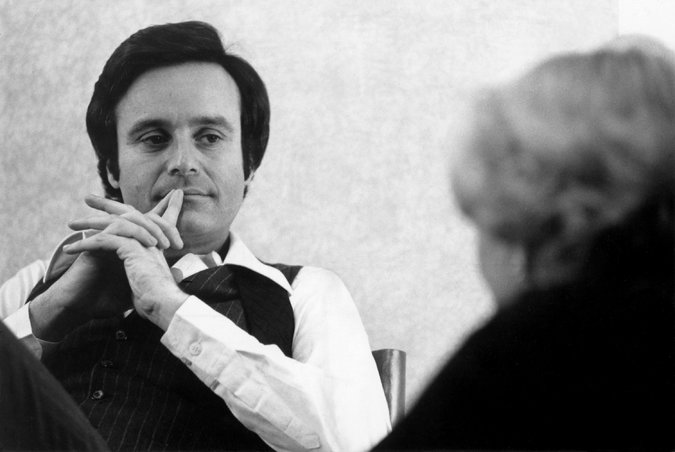Stanley Siegel (Stanley Milton Siegel)

Stanley Siegel
Stanley Siegel, an irreverent New York television talk-show host whose unscripted interviews coupled Jack Paar’s raw candor with Oscar Wilde’s credo that nothing succeeds like excess, died on Jan. 2 in Los Angeles. He was 79.
The cause was pneumonia, his nephew Richard Propper said.
“The Stanley Siegel Show” was broadcast live at 9 a.m. on weekdays on WABC from a studio in the frowzy former grand ballroom of the Hotel des Artistes on the West Side of Manhattan. Its ratings rose meteorically after its premiere in 1975.
But it fizzled after only five years, having failed to gain exposure beyond metropolitan New York, a victim of too many shifts in programming schedules and maybe of Mr. Siegel’s irrepressible personality itself, which could overwhelm his viewers.
Fearless and sometimes tasteless, Mr. Siegel grilled the transgender former professional tennis player Renée Richards about her sex life; challenged Henry M. Jackson, the starchy Democratic senator from Washington State, to tell a joke (it wasn’t funny); persuaded Gloria Steinem to kick back and do a tap dance; asked his parents if they really got along; and underwent, on camera, weekly 10-minute soul-baring therapy sessions on a couch with a psychoanalyst (followed by three weekly private appointments off camera).
Marlo Thomas, the actress, nearly stalked off the set after Mr. Siegel pointed out that she was of “the Lebanese persuasion,” adding, “In Lebanon, they have a lot of strange religions; all of them hate the Jews.”
Another time he physically restrained Timothy Leary, the psychologist and advocate of psychedelic drugs, from leaving after demanding that he say whether the suicide of Diane Linkletter — whose father, the television personality Art Linkletter, was being interviewed on the show by telephone — had been connected to her use of LSD.
During an interview with Norman Mailer about his book “The Executioner’s Song,” Mr. Siegel re-enacted the firing-squad execution of Gary Gilmore, the book’s subject — gunshots included.
“I tried something different and it backfired; I know that,” Mr. Siegel said in an interview with The New York Times in 1980 after WCBS, which had picked up his show in the meantime, declined to renew his contract. “But at least I’m willing to take risks. And tell me the truth, you’ve never seen anything like that before, have you?”
If television executives were skittish about such a hot persona in a cool medium — he was fired as a newscaster in Green Bay, Wis., after immersing himself in 45 pounds of lemon Jell-O to simulate “the dark, lamentable plight of fruits and vegetables that wind up in some anonymous cafeteria” — reviewers found him riveting.
Even John J. O’Connor, The Times’s television critic, characterized him as “generous, contemptible, thoughtful, abrasive, disarming, insufferable and charming.”
The playwright Jonathan Reynolds wrote in New York magazine in 1977 that “Not since that night in 1962, when Jack Paar threw on a pair of dark glasses to hide his tears and made the most dramatic exit the country had yet witnessed on the tube, have I come across a television character as compelling as Stanley Siegel.”
Stanley Milton Siegel was born in Los Angeles on Oct. 2, 1936, to Louis Siegel, a banker, and the former Mildred Kaufman. He was a grandnephew of Boris and Bessie Thomashefsky, stars of the early-20th-century Yiddish theater, and a cousin of both the conductor Michael Tilson Thomas and of the comedian Laraine Newman. He is survived by nephews and a niece. An early marriage ended in divorce.
As a student with chronic asthma, Mr. Siegel transferred from the University of California, Berkeley, to the University of Arizona for the drier climate. He graduated in 1960 with a degree in debate.
Mr. Siegel was a freelance radio reporter in Vietnam, covered suburban news for The Los Angeles Times and hosted two programs — a dance party broadcast in Tacoma, Wash., and a morning show in Nashville — before WABC hired him as host of “A.M. New York” in the mid-1970s. He nearly quadrupled the show’s audience, and his own show followed.
“It’s so much better to be a neurotic in New York than in Nashville,” he explained. “There they liked me, but they didn’t understand me. Here they like me and understand me.”
But after his contract was not renewed at WCBS, he returned to Los Angeles.
“His show was never syndicated, so he never became the national phenomenon that he desired or deserved,” Ron Simon, a curator at the Paley Center for Media in New York, said.
Mr. Siegel later appeared on cable television shows, including “America Talks Back” on Lifetime and “Stanley on the Go,” a travel show on RLTV on which he was as unabashed as ever, and which remained on the air until Mr. Siegel’s death. (“We were going to bury him with a microphone,” said Mr. Propper, his nephew.)
“I’m being me all the time,” Mr. Siegel once said. “In the words of Albert Einstein, great spirits are sometimes met by the violent opposition of mediocre minds.”
Born
- October, 02, 1936
- Los Angeles, California
Died
- January, 02, 2016
- Los Angeles, California
Cause of Death
- pneumonia

